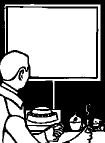ANGRY E-MAILS from readers are part of a journalist’s job. We even welcome them as a sign that someone’s reading what we write and takes it seriously enough to comment. Generally, though, we don’t respond. We’ve had our say; the readers theirs: time for both to move on.
If I make an exception for the mail in response to my Health and Fitness article, “What You ‘Know’ Could Hurt You” (Jan. 24), it’s not because I feel mistreated but because the anger and frustration expressed is evidence of a serious problem: a widening public suspicion of the medical establishment’s methods, motives, and capacity to heal.
Most correspondents took particular offense at the term “health myths” as applied to the efficacy of vitamin C in preventing colds, oat bran in preventing colon cancer, mammograms in improving women’s chances of surviving breast cancer, etc. The arguments ran more or less: “How can you say that [ ] doesn’t help? It helped me.”
The argument from experience is hard to counter, particularly because I wasn’t basing my statements on experience but on studies involving hundreds or thousands of individuals reduced to an anonymous data set, massaged into evidence by the manipulations of statistical theory: on science, in short.
There is no way that statistical truth can be squared with the truth of experience. When your doctor tells you that only one among a hundred thousand individuals has the cancer that’s going to kill you, the explanation doesn’t make you feel better; worse, probably—the “why me?” factor. And if other doctors tell you the first doctor is wrong, that your condition can be cured or at least alleviated through their ministrations, you surely can be excused for giving them a try.
Too often, though, people suffering from a condition inexplicable or untreatable by medical science conclude that someone or something is at fault. A hopeless diagnosis is interpreted as evidence that medicine isn’t scientific at all, or that the very notion of science is ideologically skewed.
If you’re in this mood, any attempt to apply the canons of reason and evidence to your case is likely to be seen as a dismissal or a sneer, prompted at best by arrogant ignorance and at worst by corrupt submission to the multibillion dollar medico-pharmaceutical establishment.
Several readers took particular umbrage at my categorization of chronic fatigue syndrome (CFS) as a “myth.” In fact, the word I used was “hypothesis” to suggest that, at present, CFS is an ill-defined collection of ambiguously related symptoms with little or no lead so far toward identifying a cause, let alone a promising cure. This is not to say that people who identify themselves as suffering from CFS are not suffering. But it does not entitle the sufferers to claim that because there is as yet no way reliably to alleviate their pain, therefore Western science is a sham, or that practitioners of mainstream medicine are heartless, ignorant, venal frauds.
Without deserving any of those ugly adjectives, though, medical doctors hardly can claim a clean bill of professional health. Like it or not, they find themselves the point personnel of the medico-insuro-governmental-industrial complex, wheedled and hectored, on the one hand, by pharmaceutical companies ravenous for earnings growth and, on the other hand, by media that love to bait their traps with medical miracles and wonder drugs. Any one physician or therapist may manage to stay clean, but statistical evidence (yes, it cuts both ways) indicates that the conscience of the profession as a whole isn’t easy. Western medicine tends to treat symptoms, not people.
An alternative philosophy of treatment exists, most notably embodied in the idea of holistic medicine, defined by an eloquent naturopathic practitioner of my acquaintance as “looking at whole patients—at the physical, psychological, emotional, mental aspects of their condition.” Naturopaths don’t work to suppress symptoms; they look for ways the patient’s life is out of balance and strive to restore equilibrium.
It sounds marvelous, and many people who have failed to find relief from symptom-oriented treatment swear by the work of naturopaths, herbal healers, and others operating outside the rigid box of mainstream medicine. One can read their testimonials on a thousand alternative-medicine Web sites. What one won’t read there are the anti-testimonials of people who weren’t helped or were actively harmed by putting their faith in such treatments.
Isn’t an attachment to traditional Western medicine just as much a matter of blind faith? For the patient, perhaps; but Western medicine, however reluctantly and imperfectly, is committed to taking notice of those dissenting votes, the awkward exceptions, the terrible mistakes.
Standard medicine is not scientific because doctors are scientists; it’s scientific because it’s bound by rules: of evidence, of statistics, of probability, of the logic of cause and effect. The biomedical establishment isn’t hostile to proponents of natural healing just because they represent competition for the patient’s dollar.
For outsiders, it’s a frustrating standoff. The more we see of the medical machine, the more we fear getting caught up in its all-masticating jaws. More often than not, alternative medical practices seem more humane, down-to-earth, caring. But until their practitioners are willing to square their theories with, at a bare minimum, the laws of physics, I, for one, am going to be leery of putting my life in their hands.
Roger Downey’s science column appears every other week.








